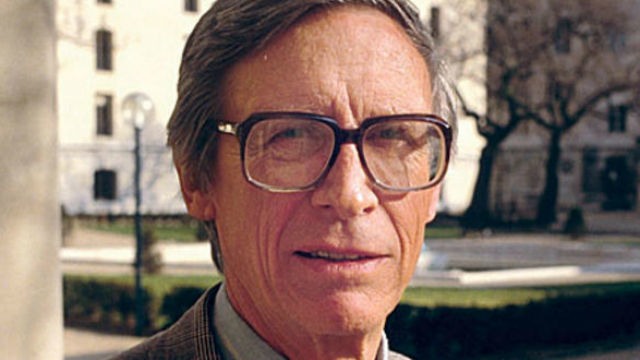The legal outcome of too many morally contentious political issues in our time is now guaranteed in advance. Take abortion, gay marriage, and transgender “rights.” These causes prevail at court not because of any provision in the Constitution, but because of the Rawlsian philosophy of jurisprudence that permeates America’s top universities and law schools.
Writing in the Times Literary Supplement, the British philosopher Jonathan Wolff suggested that while there might be a dispute about the second most important political philosopher of the twentieth century, there could be no dispute about the most important: John Rawls. His widespread influence is especially strong among our nation’s educated elite—in other words, those who make up the vast majority of federal judges.
Nearly 40 percent of all federal judges graduated from one of six schools: Harvard, Yale, Columbia, Georgetown, the University of Virginia, and the University of Texas at Austin. The spectrum is even narrower on the current Supreme Court, where four justices attended Harvard (Roberts, Breyer, Kagan, and Kennedy), as did the late Justice Scalia; three went to Yale (Thomas, Alito, and Sotomayor), and one attended Columbia (Ginsburg). It’s likely no future judge could graduate without having to demonstrate significant knowledge of Rawls’s two major works, A Theory of Justice and Political Liberalism, in which Rawls defends the basic principles of “justice as fairness.”
The forces that foreordained the decision in the same-sex marriage case are likely to do so in future cases involving decisions about euthanasia, transgender rights, and polygamy, among others, regardless of the quality of arguments marshaled by opponents. I would like to suggest four ways in which Rawlsian tendencies determine the decisions of courts and skew the results in a particular direction. Difficulties arise, first, due to the way Rawlsianism absolutizes “rights”; second, because of the nature of the “fairness” it asserts as the necessary prerequisite for justice; third, because of the autonomous, unencumbered self Rawlsianism presupposes; and fourth, because of the Rawlsian insistence that the state must be neutral with respect to notions of the good—a principle that is in practice mostly illusory.
Start your day with Public Discourse
Sign up and get our daily essays sent straight to your inbox.Rights as Trumps
In A Theory of Justice, Rawls argued, in opposition to utilitarian theories, that
Each person possesses an inviolability founded on justice that even the welfare of society as a whole cannot override. For this reason justice denies that the loss of freedom for some is made right by a greater good shared by others. . . . the rights secured by justice are not subject to political bargaining or to the calculus of social interests.
The results of this line of thought are troubling. If something gets labeled as a “right” by some judge—let us say, gay marriage—then any research on the social consequences of this decision will simply be tossed out in advance. If something is a “right,” it can’t be subjected to “political bargaining” with a view to “the calculus of social interests.” Sociological data about outcomes for children, for example, won’t make the slightest bit of difference to justices imbued with the Rawlsian notion of “rights.” They are trained to believe that true servants of justice absolutely must not give in to such utilitarian considerations.
This resistance is more than a little odd in a society where utilitarian considerations trump moral demands all the time. Embryonic stem cell research and genetic modification of discarded embryos (the latter has now been approved in the United Kingdom) are just two examples of how traditional moral concerns are dismissed in favor of the benefits that might result from these experiments. And, of course, the ubiquity of abortion at all stages makes it clear that the rights of the unborn child are certainly not allowed to “trump” the “calculus of social interests.”
Justice as Fairness
A second problematic pillar of the Rawlsian framework involves what Rawls termed “justice as fairness.” Because people tend to seek their own interests, Rawls proposed a system whereby persons “decide in advance how they are to regulate their claims against one another.” To do so, Rawls proposed what he termed the “veil of ignorance,” behind which “no one knows his place in society, his class position, or social status” and thus “no one is able to design principles to favor his particular condition.” Rawls believed that rational persons behind such a “veil of ignorance” would choose two basic principles to govern themselves: the first would require “equality in the assignment of basic rights and duties,” while the second would require that social and economic inequalities would be permitted only if they resulted in “compensating benefits for everyone, and in particular for the least advantaged members of society.”
In Rawls’s view, equality is paramount. “Justice” means “leveling the playing field,” so that the “disadvantaged” can act on equal terms with others. In the case of same-sex marriage, if a person identifies as “gay,” and if a judge determines that this group has been disadvantaged (as surely they have been), then a judge with a Rawlsian predisposition would be likely to make special efforts to ensure their fundamental equality with others.
Could we really manufacture “equality” in all relevant areas of life, even if we wanted to? Could we, for example, manufacture an equality of families? Rawls tellingly acknowledges that “the principle of fair opportunity can be only imperfectly carried out, at least as long as the institution of the family exists.” We might suspect, then, that a perfectly consistent Rawlsian would work tirelessly to eradicate the family as the last bastion of “unfairness.” Thus, when someone like Mark Regnerus presents evidence that certain family structures are better for children, such evidence could only work against the position of those who cite his work. Since the quality of one’s family is one of those “natural assets” that creates an unequal distribution of society’s benefits, its effect must be minimized as much as possible.
The Unencumbered Self
As Michael Sandel has pointed out in Democracy’s Discontent, the Rawlsian view “derives much of its moral force from the appeal of the self-image that animates it.” The image of “the self as free and independent, unencumbered by aims and attachments it does not choose for itself,” can be a “powerful liberating vision,” admits Sandel. For the purposes of all our public, political pursuits, we are to be treated as “self-originating sources of valid claims.”
As appealing as this self-image may seem, at least two difficulties arise for any political system that sets this notion of the self at its foundation. As Sandel points out, despite its powerful appeal, the image of the unencumbered self is flawed because
it cannot account for certain moral and political obligations that we commonly recognize, even prize. These include obligations of solidarity, religious duties, and other moral ties that may claim us for reasons unrelated to a choice. Such obligations are difficult to account for if we understand ourselves as free and independent selves, unbound by moral ties we have not chosen. Unless we think of ourselves as encumbered selves, already claimed by certain projects and commitments, we cannot make sense of these indispensable aspects of our moral and political experience.
If we owe only what we agree to, then Rawlsian justice cannot demand that we advance other people’s good. How could it? The notion of “the good” has been specifically ruled out. Rawls himself admits that “there is no political obligation, strictly speaking, for citizens generally.” Those who run for political office would be tacitly agreeing to certain obligations, but as Sandel puts it, “The average citizen is . . . without any special obligation to his or her fellow citizens, apart from the universal, natural duty not to commit injustice.”
Why ought I to help my fellow citizens—even the ones I might judge to be lazy and irresponsible—if I am not obligated to help my own father with Alzheimer’s? The counter-intuitive result, evidence of which we see all around us, is the widespread conviction that society is required to pay for my father’s care, but I, his son, am not.
In such circumstances, arguments about the “social benefits” of care by one’s own family members would be to no effect precisely because (A) “social benefits” cannot be measured against “rights” as “trumps” if I have a right to my own values and to decide upon my own encumbrances, especially with regard to family, and (B) entertaining the possibility of “encumbrances” such as those presented by family ties would undermine the entire notion of the liberal, “unencumbered” self. As a result, only the government can reliably secure the cooperation of the citizenry in any scheme of general welfare. It is an uncomfortable paradox. The more that citizens are convinced that they have no civic obligations apart from those they freely choose, the more likely it becomes that the government must secure their cooperation for any such scheme by means of its compulsory powers.
More simply, everyone has rights, but no one has responsibilities. It is not without reason that one of the major challenges of modern moral philosophy has been to come up with a sufficient rational justification for convincing modern autonomous individual “selves” that they ought to become “other-regarding.”
The Abandonment of the “Good”
There is at least one other problem with adopting the notion of the “unencumbered self” as the basis of justice: it leads to emotivism and to the abandonment of any rational grounds upon which arguments for the social good or even the private good of the individual could be based. As Alasdair MacIntyre has argued in After Virtue:
one way of re-envisaging the emotivist self is as having suffered a deprivation, a stripping away of qualities that were once believed to belong to the self. The self is now thought of as lacking any necessary social identity, because the kind of social identity that it once enjoyed is no longer available; the self is now thought of as criterionless, because the kind of telos in terms of which it once judged and acted is no longer thought to be credible.
With this notion of the “self,” arguments about “the good,” especially those concerning the “common good of the society,” become meaningless. The more citizens become aware that they are lacking any independently convincing rational justification for their own judgments about what is for the good of the nation, the more they will come to doubt the rationality of their opponents. The suspicion that all such arguments are merely “masks” for a person’s will to power causes each side to suspect the hidden motives of its opponents.
When it comes to many of the fiercest political battles of our day, both sides have been intractable precisely because this notion of the unencumbered self is at stake. Challenging the Rawlsian resolution of abortion, euthanasia, gay marriage, and transgenderism is taken to be a challenge to the very conception of the unencumbered self that undergirds the entire Rawlsian and modernist project. It is a challenge to the self as autonomous and totally self-defining. What is at stake is precisely any notion of the human person that might regard us as obligated to fulfill ends we have not chosen—ends given by nature or God, for example, or by our identities as members of families, peoples, cultures, or traditions. Encumbered identities such as these are at odds with the liberal conception of the person as free and independent selves, and thus must be treated, for political purposes, as impermissible attacks on the very foundation of the system.
In tomorrow’s essay, I’ll discuss the final pillar of the Rawlsian framework that skews all public deliberation in the courts in a pre-determined direction: the claim that the government must be “neutral” with regard to all competing conceptions of the good.













